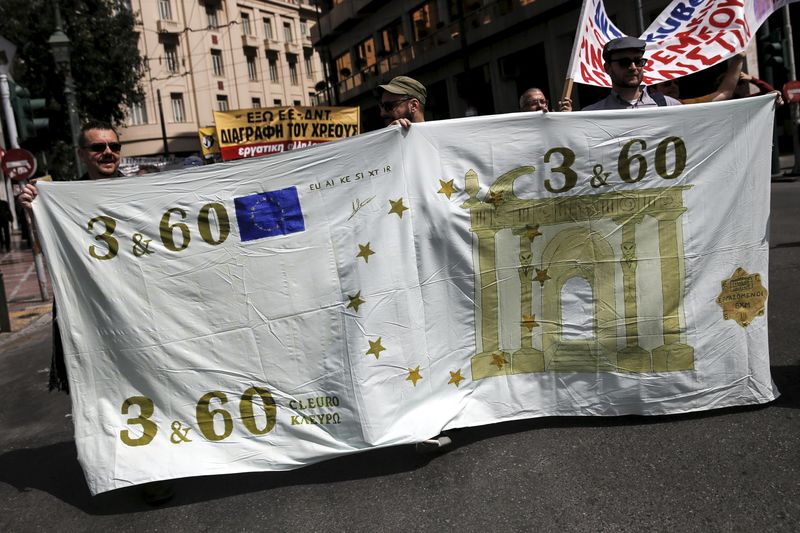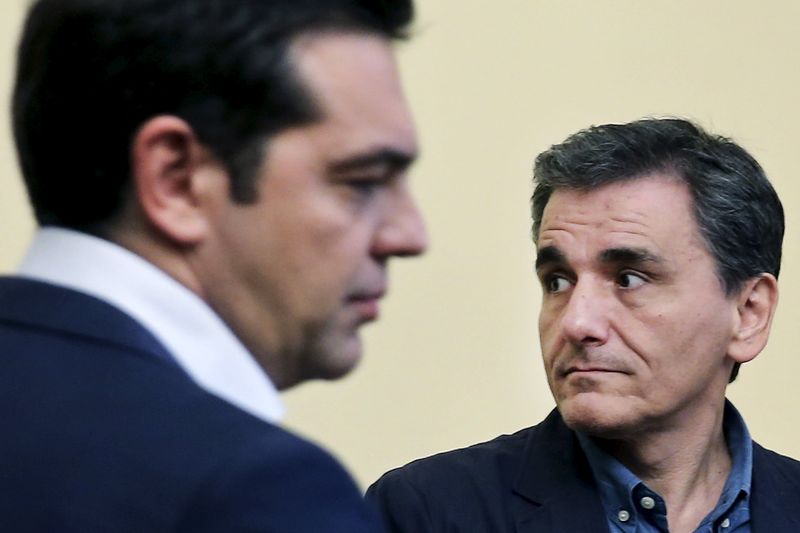By Renee Maltezou and Lefteris Papadimas
ATHENS (Reuters) - Greece hopes to agree this week with its foreign creditors the package of measures it needs to legislate to conclude a crucial bailout review, but differences among EU and IMF institutions remain, sources close to the talks said on Thursday.
The review has dragged on for months mainly due to a rift among the lenders over Greece's fiscal shortfall by 2018 - initially seen at 3 percent by the EU, 1 percent by Athens and 4.5 percent by the IMF.
Athens and its lenders - the Commission, the European Central Bank, European Stability Mechanism and the International Monetary Fund - have agreed to use 3 percent as the baseline scenario in the Athens-based talks.
But the EU and the IMF are still at odds on whether Athens could achieve a 3.5 percent primary surplus - budget balance before debt service payments - in 2018, an official participating in the talks told Reuters.
The IMF, which will decide whether to co-finance Greece's third bailout after the review and in light of how much debt relief Greece receives, believes Athens will miss its 2018 surplus target, even if it implements measures worth 3 percent of GDP, the official said.
EU institutions believed the target was feasible. Faced with a huge refugee crisis - which has catapulted Greece to the forefront of a massive refugee influx into Europe in the past year, the EU is keen to resolve the financing logjam swiftly.
Underlying differences among the lenders on the extent of fiscal consolidation Greece needs to pursue would be reflected in assessment documents compiled by the IMF, and the EU institutions possibly by Sunday, government officials and sources close to the talks said.
"There will be a document from the side of the three European institutions - basically the ESM - and another document, drawn up with the IMF. These documents will look alike but won't be the same," Finance Minister Euclid Tsakalotos said after meeting the four inspectors on Wednesday.
"We hope to finish on Sunday by teatime," the British-educated economist said.
If concluded, the review will pave the way for talks on debt relief with the EU and potentially unlock an estimated 5 billion euros in bailout funds.
Athens needs the money to repay 3.5 billion euros to the International Monetary Fund and the European Central Bank in July, as well as unpaid domestic bills.
Holding a fragile parliamentary majority, Prime Minister Alexis Tsipras hopes a debt restructuring will convince Greeks that their sacrifices are paying off after six years of belt-tightening. But the delays have cast a shadow on his plans.
Some of the measures discussed - the management of bad loans, pension cuts and tax hikes - were politically difficult for Tsipras' left-wing government, which was re-elected in September on promises to mitigate the impact of austerity.
To achieve its targets, Athens aims to save one percentage point from cutting pension spending, another point from raising income tax and 1 percent of GDP from tax measures, which have not yet been agreed. It is also considering raising fuel tax and value-added tax on cigarettes, among other measures.

Tsipras hopes for a compromise before April 22, when euro zone finance ministers assess its progress. Some euro zone ministers will attend the spring meetings of the IMF in Washington on April 15-17.
